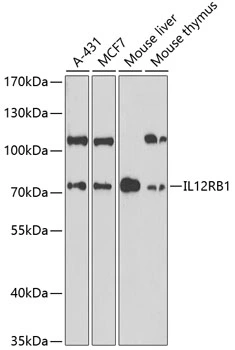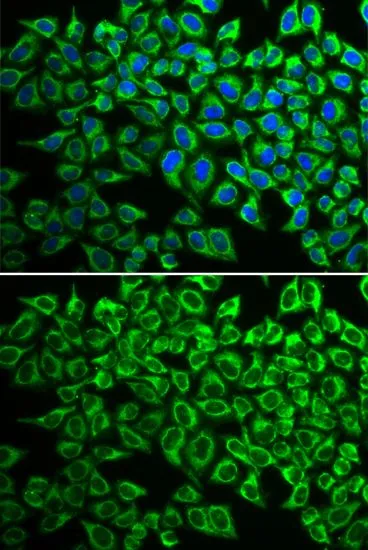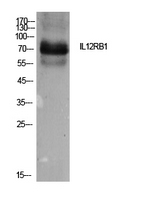
WB analysis of various sample lysates using GTX55677 IL12 Receptor beta1 antibody. Dilution : 1:1000 Loading : 25μg per lane
IL12 Receptor beta1 antibody
GTX55677
ApplicationsImmunoFluorescence, Western Blot, ImmunoCytoChemistry
Product group Antibodies
ReactivityHuman, Mouse
TargetIL12RB1
Overview
- SupplierGeneTex
- Product NameIL12 Receptor beta1 antibody
- Delivery Days Customer9
- Application Supplier NoteWB: 1:500 - 1:2000. ICC/IF: 1:10 - 1:100. *Optimal dilutions/concentrations should be determined by the researcher.Not tested in other applications.
- ApplicationsImmunoFluorescence, Western Blot, ImmunoCytoChemistry
- CertificationResearch Use Only
- ClonalityPolyclonal
- ConjugateUnconjugated
- Gene ID3594
- Target nameIL12RB1
- Target descriptioninterleukin 12 receptor subunit beta 1
- Target synonymsCD212, IL-12R-BETA1, IL12RB, IMD30, interleukin-12 receptor subunit beta-1, IL-12 receptor beta component, IL-12 receptor subunit beta-1, IL-12R subunit beta-1, cluster of differentiation 212, interleukin 12 receptor, beta 1, interleukin-12 receptor beta-1 chain
- HostRabbit
- IsotypeIgG
- Protein IDP42701
- Protein NameInterleukin-12 receptor subunit beta-1
- Scientific DescriptionThe protein encoded by this gene is a type I transmembrane protein that belongs to the hemopoietin receptor superfamily. This protein binds to interleukine 12 (IL12) with a low affinity, and is thought to be a part of IL12 receptor complex. This protein forms a disulfide-linked oligomer, which is required for its IL12 binding activity. The coexpression of this and IL12RB2 proteins was shown to lead to the formation of high-affinity IL12 binding sites and reconstitution of IL12 dependent signaling. Mutations in this gene impair the development of interleukin-17-producing T lymphocytes and result in increased susceptibility to mycobacterial and Salmonella infections. Alternative splicing results in multiple transcript variants. [provided by RefSeq, Feb 2014]
- ReactivityHuman, Mouse
- Storage Instruction-20°C or -80°C,2°C to 8°C
- UNSPSC12352203






